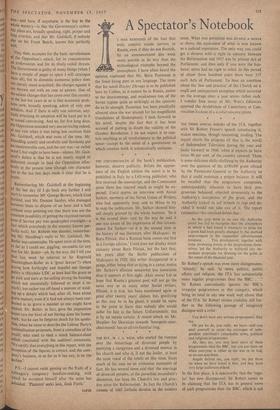THE CIRCUMSTANCES of the book's publication, however, deserve publicity. Before
the appear- ance of the English edition the novel is to be published in Italy by a Left-wing publisher, who first received the manuscript, and the Communist press there has reacted much as might be ex- pected. Unita quotes an interview with Alexei Surkov, secretary of the Soviet Union of Writers, who had apparently been sent to Milan to try to stop the publication. Mr. Surkov showed him- self deeply grieved by the whole business. 'So it is the second time—and by the way he said it one was aware of the importance of this circum- stance for Surkov—so it is the second time in the history of our literature, after Mahogany, by Boris Pilniak, that a Russian book comes out first in a foreign edition.' Unita does not display much curiosity about Boris Pilniak, but the fact that, ten years after the Berlin publication of Mahogany in 1929, this writer disappeared in a purge, either being shot or dying in a camp, makes Mr. Surkov's allusion somewhat less innocuous than it appears at first sight. Absit omen! Let us hope that Russia's greatest poet will not go the same way as so many other Soviet writers. Pilniak, it is true, has been mentioned again in print after twenty years' silence, but, gratifying as this may be to his ghost, it would be more to the point to learn that nobody else would sufler his fate in the future. Unfortunately, this is by no means certain. A recent attack on Mr. Shepilov for liberalism towards 'bourgeois-anar- chist moods' has an all too familiar ring.


































 Previous page
Previous page